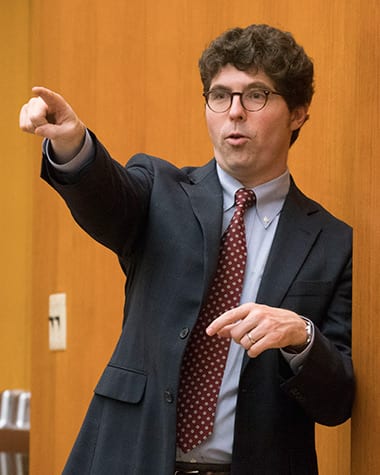By Andrew Cohen

The Socratic Method, where law professors prod critical thinking under pressure through unrelenting questions to an unsuspecting student, is widely seen as a proven learning tool but rarely enjoyed in the moment.
Andrew Bradt, however—Socratic Method devotee and winner of Berkeley Law’s Rutter Award for Teaching Distinction this year—is a rare educator.
“He questions with such patience and deftness as to lead you to the right answer without you even realizing it’s happening,” says 2L Alexandra Copper, who took his Civil Procedure and Multidistrict Litigation courses last year. “This takes a special person and a great lawyer. It also requires knowing your students, something Professor Bradt takes the time to do.”
Established in 1995 by the late William Rutter—a philanthropist, lawyer, educator and author—the award honors an instructor who inspires students and demonstrates a deep commitment to teaching.
Bradt, who joined Berkeley Law’s faculty in 2012, will receive the Rutter Award during a ceremony on April 2. He calls it “the greatest honor of my professional life. To be even on the same list as the past winners is mind-boggling to me. I really enjoy teaching such a diverse, eager, and smart group of students here.”
Even before graduating from Harvard Law School in 2005, where he won the Joseph H. Beale Prize for Conflict of Laws, Bradt had his sights set on academia. That never wavered during seven years as a law-firm litigator in New York City and Boston, a clerk for two federal judges, and a Climenko Fellow and Lecturer back at Harvard Law.
“I thought of my years in practice as ways of getting real-world experience that would enhance my teaching,” Bradt concedes. “That said, when you walk into a classroom and see 100 people looking at you, waiting for you to say something, it’s simultaneously terrifying and invigorating.”
Threading the MDL needle
A scholar of civil procedure, conflict of laws, and remedies and a go-to national expert on federal multidistrict litigation, Bradt laughs when admitting had never heard of MDL in law school. He learned about it on his first day clerking, and quickly became interested.
“It’s amazing to think that MDL cases now comprise one-third of the federal civil docket, including some of the defining civil matters of our time,” Bradt says, noting the BP oil spill, NFL concussion controversy, and opioid crisis. “There’s a real recognition of need to group enormous cases together. But in order to do that, you have to thread the needle through the doctrinal thicket. Seeing how MDL works is really fascinating.”
Appointed to the Supreme Court Fellows Program’s Academic Advisory Board last year, Bradt savors the collaborative and supportive environment at Berkeley Law.
“You don’t get a lot of training for how to teach law school, and I’m very lucky that Berkeley has an extremely strong culture that prioritizes good teaching,” he says. “Part of that is a constant interaction among faculty members about how we can keep improving.”
Dylan Silva ’15, an associate at Covington & Burling in San Francisco, took Bradt’s Civil Procedure course and served as one of his research assistants for three years.
“He was an invaluable mentor to me and many others throughout our time in Berkeley Law,” Silva says. “Professor Bradt is one of a kind—he has that unique ability to make just about anything interesting and relevant. The law school is fortunate to have an educator and academic of his caliber.”
No argument from Copper.
“To me, what makes him such a brilliant instructor is his compassion combined with his ability to question,” she says. “Professor Bradt teaches by empowering us with the right knowledge and the right questions. He’s utterly deserving of this award and I’m thrilled to see his dedication recognized, as his students benefit from it every day.”